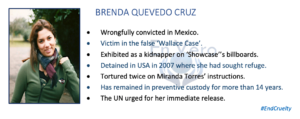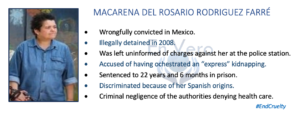Source: Radio Canada
Authors: Martin Movilla and Jean-Michel Leprince
January 14, 2020 (Original publication in French on November 7, 2019)
Translation: Jorge B.
Note: En Vero would like to highlight the involvement of the Organization ASP AFRIQUE and of its CEO Georges Waklatsi-William in seeking the release of Judith Brassard whom we warmly thank for his support in the matter. We are also proud to announce the upcoming signing of a partnership between ASP AFRIQUE and En Vero.
ASP AFRIQUE is a non-partisan, secular NGO created by a group of African, European intellectuals and human rights defenders. Website: here.
New hope before the UN for Quebecer Judith Brassard
Imprisoned for 11 years in Colombia, a Quebec woman sentenced for the murder of her husband continues to fight to prove her innocence. Despite another setback, the case of Judith Brassard will make its way to the United Nations next week.
After the Colombian Supreme Court again refused to reopen the case, the non-governmental organizations En Vero and Fondejusticia y Verdad decided to bring the case before the United Nations Working Group on Arbitrary Detention.
According to these two human rights organizations—one in Canada and the other in Colombia—the Colombian justice system went relentlessly after Judith Brassard, in defiance of the presumption of innocence and reasonable doubt. They assure that only the international community can do something about it.
The Quebec woman was sentenced in 2010 to 28 years in prison for having ordered the murder of Felipe Rojas Gnecco, shot by a hit man, without any material evidence and on the basis of false testimony which has just been recognized as such by the Colombian justice system.
False testimonies
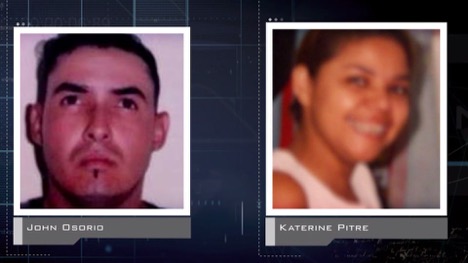
After a decade of investigation, the public prosecutor’s office brought charges of false testimony and procedural fraud (manipulation of justice) against the key witnesses that had testified against Judith Brassard.
The two accused admitted the facts and two different judges convicted them. Jhon Osorio, who organized the murder and accused Judith Brassard, received a 10-year sentence. His wife Katherine Pitre was sentenced to 6 years in prison.
In one of the decisions, the judge considered that Jhon Osorio’s version was contradictory and inconsistent and that the statements against Judith Brassard were not credible. These statements, he said, resulted in the conviction of an innocent person.
Judith Brassard’s in-laws, however, challenged the two false testimony judgements and were successful in the Supreme Court—once again and despite new evidence.
In a legal opinion, the family’s lawyer assured that there had never been false testimonies and that these sentences were the result of the bad faith, the ignorance or the naivety of the judges. And he didn’t stop there. He claimed that these judgements have only one objective: to reopen the case of Judith Brassard.
She has always proclaimed her innocence, but for her in-laws and for the Colombian justice system, only she could profit from the death of Felipe Rojas Gnecco.
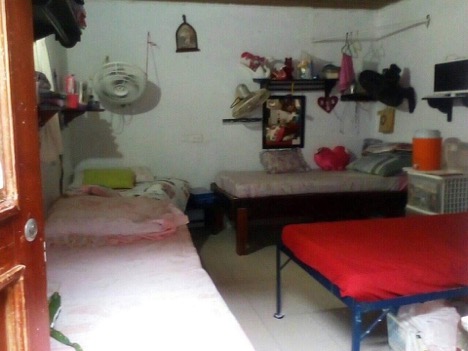
Behind the Felipe’s murder and Judith Brassard’s sentencing, there is a dark story filled with mysteries, lies, manipulation, judicial harassment and conflicting legal decisions.
A murder that shattered many lives
This legal saga begins on Monday, December 4, 2006, in Santa Marta, a paradise in the Colombian Caribbean.
Fifteen blocks from the beach, orthodontist Felipe Rojas Gnecco approaches his car, which is parked in front of the La Perla del Caribe clinic, where he has his dental office. Two sicarios —those hit men used by criminals to attack their enemies—are waiting for him near the door.
One of them takes out his pistol and shoots the orthodontist three times at point-blank range. The screeching of tires and the screams of people melt into a single noise as the two criminals disappear in traffic. They leave behind the body of a young man, father of two children.
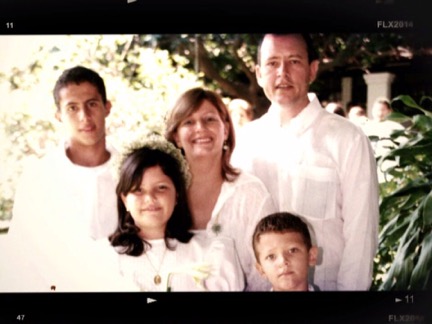
At the time of the murder, she was in Montreal, where she had come with her children to get away from a life she no longer cared for.
The murder came at a time when divorce proceedings and a bitter struggle for custody of their two children, born in Colombia, were underway.
In the last weeks before the murder of her husband, Judith Brassard had decided to separate, keep their children, ask for a divorce and take—without Felipe’s authorization and by falsifying his signature—the money that the couple held at a bank in the United States.
All these decisions, to which were added lies and infidelities, were related to a couple relationship that was falling apart. But combined with false testimony, these decisions became, for the Colombian justice system, justifications leading to the conviction of Judith Brassard.
An announced conviction
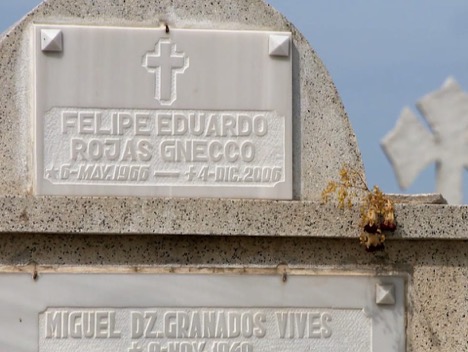
From the start of her trial, the Colombian media—especially those who were convinced of her guilt—nicknamed Judith Brassard “the Canadian black widow.”
On February 24, 2010, after a nine-month trial, the Quebecer was sentenced to 28 years in prison and a $ 2 million fine in compensatory damages to the family of the victim, without any evidence having been provided to the courts.
Today, En Vero and Fondejusticia y Verdad want to draw the attention of the United Nations and the whole world to the absence of reasonable doubt and the presumption of innocence in the Colombian judicial system up to the highest level, which it is based on these very same principles.


